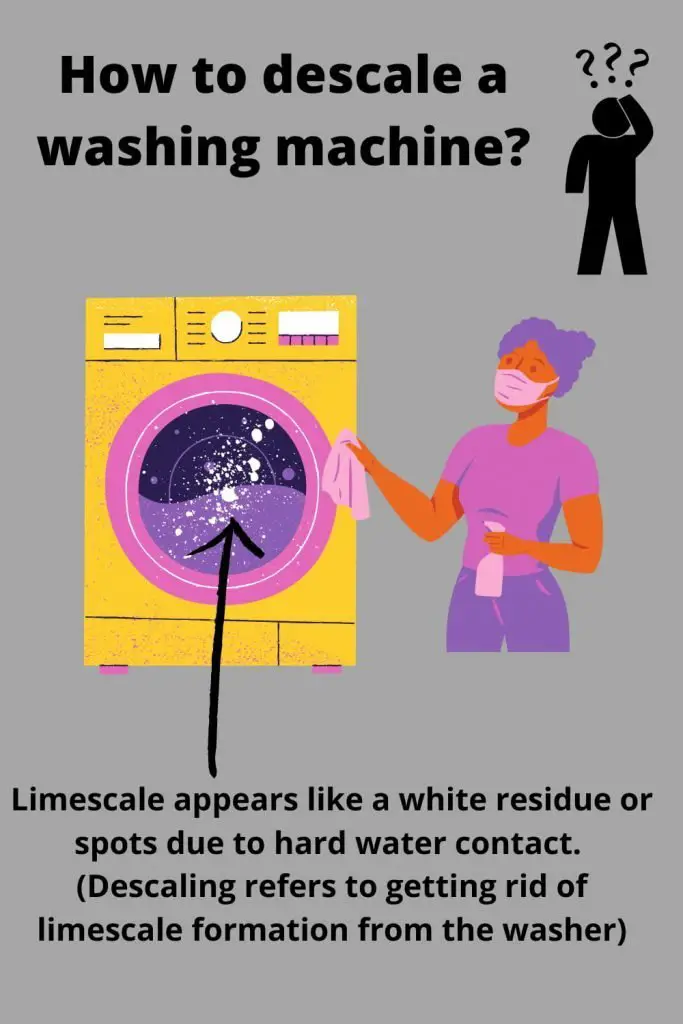In today’s post, I’m going to show you exactly how to descale your washing machine effectively step-by-step.
In fact:
These are the same strategies that we use to get rid of limescale and tough stains from our washers.
Let’s dive right into it.
If you have a hard water supply, then periodically cleaning or descaling your washer becomes a must.
Limescale appears like chalky patches on the surfaces in the washer and other household equipment, due to constant contact with the hard water.
What is descaling in Washing Machine?
Washing machine descaling is a process to remove the limescale deposits from the washing machine. Descalers can be purchased at most hardware stores, or you can make your own using simple household ingredients like vinegar or baking soda.
So it’s basically a process to get rid of limescale residues from the drum area, gasket, hose, pipe, heating element, and the components that are frequently exposed to hard water during the wash cycle.
While limescale isn’t harmful to your health, it can be a pain to remove and will cause your appliances to run less efficiently.
If your washing machine has started to build up limescale, you may notice that it takes longer to complete a cycle, or your clothes aren’t coming out as clean as usual.
Why Descale a washer?
Descaling a washer has several benefits and the major benefit is that it prevents the heating element from severe damage, which means it prolongs the life of your washing machine.
Limescale buildups may lead to failure of the heating element and the repairing or replacement cost could be a lot.
When to Descale a washer?
If you are in a region that supplies hard water and you notice the existing Limescale formation in form of white patches in the drum, door, gasket, or any other areas it means you should descale your washer sooner than later.
How often should you descale a washer?
Descaling a washer depends on the quality of water used in your laundry.
If you are in a region that supplies hard water then using a water softener becomes a must to prevent limescale formation in the first place.
As a general rule of thumb, descaling the washer once a month is recommended. And you should not wait until the next descaling schedule if you notice an early buildup of limescale residues.
How to descale a washing machine step by step?
There are products available and specially formulated with descaling solutions for the washers. These washing machine descalers are available in the form of powder, tablets, and liquid gels that deliver more efficient and long-lasting results.
The chemical agents of such descalers effectively withdraw limescale deposits from the parts of the washer that are in constant contact with hard water.
So, there are 2 two ways to descale your washer.
- By using descaler powders
- By using the natural remedy
Let’s take a quick look at both the approach OR method and then you can decide which one suits you the best.
Descaling the washer using a descaling powder product
In order to descale a washer simply follow the below step-by-step instructions.
Step 1: First make sure that the washtub is empty before starting the descaling process.
Step 2: Add the descaler powder to the detergent drawer (Read the label carefully for the correct dosage). You may directly add the descaler powder to the washtub as well.
Step 3: Fill the washtub with water (temperatures ranging from 40° to 50°).
Step 4: Run the empty cycle for around 50 to 60 mins.
Step 5: After the clean cycle has been completed, you may wipe the inner walls of the washer with a damp cloth.
Step 6: You may run an empty cycle with clean water to thoroughly rinse your washer.
Your washer should be free from limescale deposits and you may continue your laundry stuff.
Note: If you have a hard water supply, then you may consider descaling your washer once every month.
Descaling of washers can also be done using simple home remedies such as vinegar, baking soda, lemon juice, etc.
Let’s look at how you can descale a washer using simple home remedies.
Also Read: How to clean Samsung washing machine filter top loader?
Descale a washing machine naturally
Descaling the washer naturally can be done by using natural descaling agents such as distilled vinegar, baking soda, lemon juice, etc.
In order to descale your washer naturally you may follow a few simple steps listed below:
Step 1: Add 2 cups of distilled vinegar to the soap dispenser of the washer.
Step 2: Make a thick paste of baking soda with water and apply it to the inner walls of the wash drum and reachable corners inside the washer.
Step 3: As a booster, pour 2 cups of lemon juice inside the washtub directly.
Step 4: Let the mixture settle for about 20 minutes and run the clean or normal cycle with hot water for about 90 minutes.
The combination of diluted acetic acid (vinegar), citric acid (Lemon), and sodium bicarbonate (baking soda) attacks and removes the limescale and odor-causing residues including bacteria (mold and mildew) from your washer.
How do you take care of the washing machine?
Here are some tips to take care of your washer and prevent the buildup of limescale residues.
- Caring for a washer starts right from its installation, hence always choose a place that is suitable and safe for the washer with all the required fixtures available (electric, water connection, drain, vent, etc.).
- It is always a good idea to use a suitable stand for your washing machine, this protects the base surface of your washer.
- Overloading a washer against the set capacity is a common cause of laundry failures. Hence do not overload the washer for better performance and prolonged life.
- Selecting suitable detergent and washing machine cleaners is a must. Along with choosing the right product you also need to use the right amount in every wash, to maintain the performance of the washing machine.
- Keep the door or the lid open for about 20 to 30 minutes after every wash cycle, this helps the moisture out of the wash drum.
- It is recommended to use water softeners if you have a hard water supply in your laundry system.
- Regular inspection of the washer parts is a good practice, this gives you an idea of when and what area of the washer needs attention.
- Running a clean cycle once a month using cleaning products or by using home remedies is always a good practice.
- Clean the other parts such as hoses, soap/detergent dispensers, Vent and drain areas, and the filters (lint filter) as these are the most common areas that get damaged if not cared for.
- Make limited use of Fabric Softeners.
- Do not self troubleshoot issues that you have never seen before.
- Lastly, although there are loads of tips available to fix several issues related to your washer, do not hesitate to take an expert’s advice for sensitive and technical issues.
Final Thoughts
Limescale is formed due to constant contact with the hard water that leaves behind chalky patches on the surface.
Cleaning your washer with descaling solution once a month or after every 30 cycles is always a good practice
For more information on laundry care tips do visit our FAQ section.
Frequently Asked Questions
Here are some common questions related to descaling that are asked very frequently.
Can you descale with vinegar?
Using distilled vinegar to descale your washer is a common practice. It is one of the best home remedies to get rid of adamant stains. Vinegar contains diluted acetic acid that attacks the limescale residues and keeps odor-causing molds and bacteria away. Simply, add 2 cups of distilled vinegar to the soap dispenser or directly to the washtub, and run a clean or normal cycle for around 60 minutes.
Can you descale with apple cider vinegar?
Yes, having similar properties to distilled vinegar, apple cider vinegar can be used as a descaling agent. It is also said to be containing antibiotic that helps in killing bacteria.
What is Descaler powder made of?
A Descaler powder is made up of mild acidic formula that reacts with calcium and magnesium carbonate compounds present in limescale residues.






